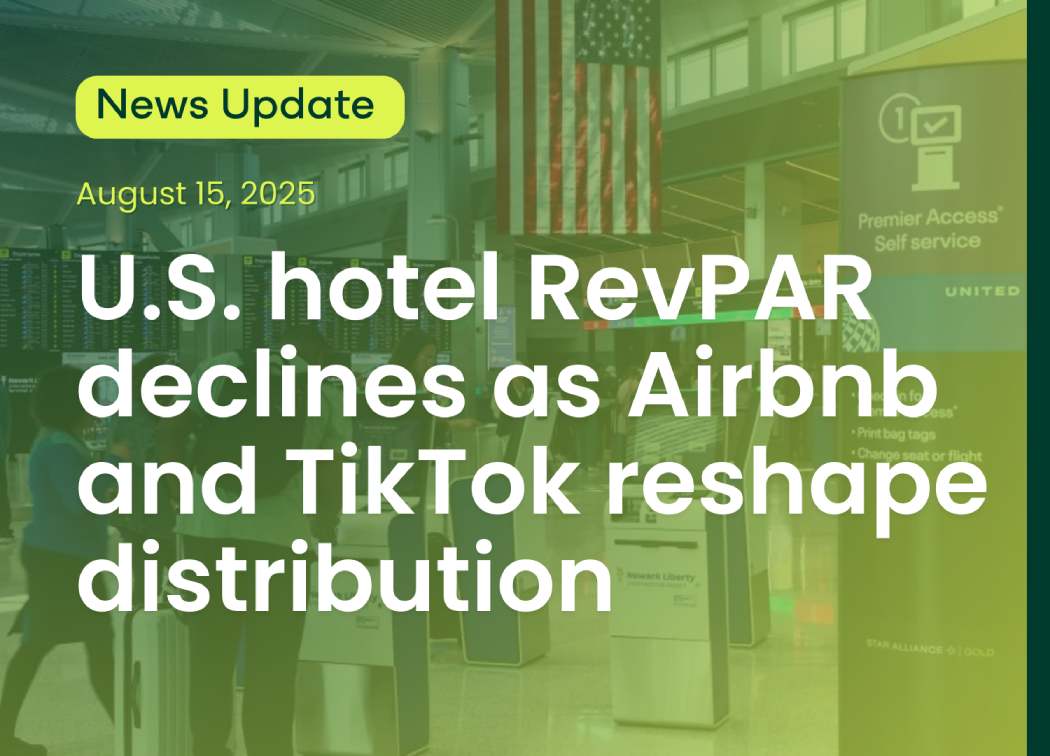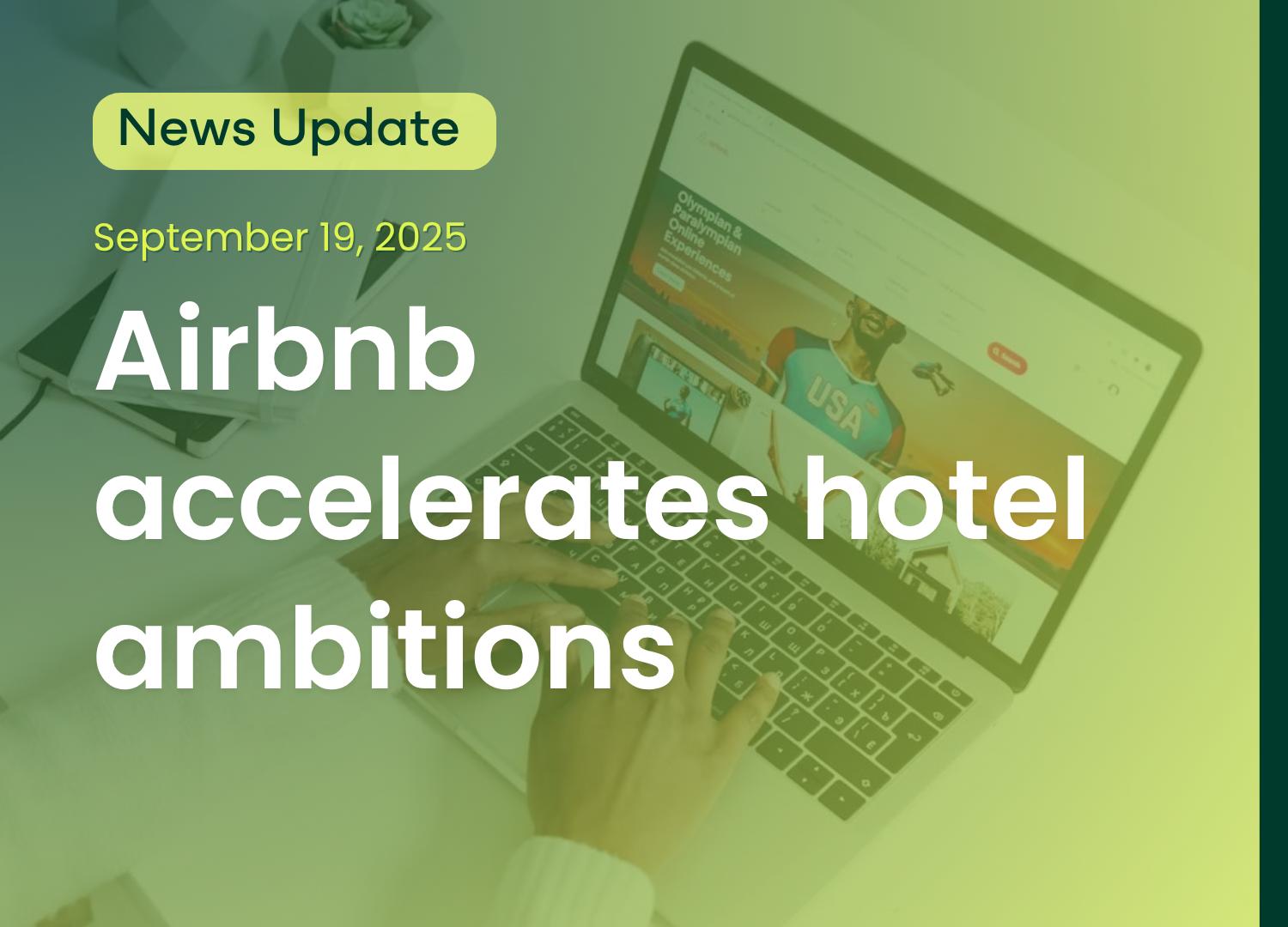U.S. hotel RevPAR declines dominate as Airbnb and TikTok reshape distribution
This week’s hospitality updates reveal a challenging environment for hoteliers, as U.S. revenue performance declines highlight mounting economic pressures. At the same time, distribution and guest acquisition are being reshaped by bold moves from Airbnb, Tripadvisor, and even TikTok. Together, these stories underline both the risks of softened demand and the opportunities emerging from new digital channels.

U.S. hotel industry anticipates slower growth until 2026
The U.S. hotel industry is preparing for decelerated growth as projections for 2025-26 are adjusted downward by CoStar and Tourism Economics. This revision, shared at the 17th Annual Hotel Data Conference, is attributed to ongoing economic uncertainties and lower than anticipated performance metrics such as demand, Average Daily Rate (ADR), and Revenue Per Available Room (RevPAR). Demand, specifically, is expected to decline by 0.6 percentage points in 2025, followed by a 0.5 point drop in 2026.
Amanda Hite of STR pointed out that challenges such as persistent inflation, tough calendar comparisons, and evolving travel behaviors are suppressing demand. However, there remains a cautious optimism for performance improvements post-trade talks and budget reconciliation. Aran Ryan from Tourism Economics added that while the U.S. economy is slowing, it is not forecasted to enter a recession, with growth expected from tax cuts and reduced policy uncertainty by 2026. Despite consistent Gross Operating Profit Per Available Room (GOPPAR) forecasts, GOP margins are expected to lower due to potentially rising expenses in sectors like food and beverage.
U.S. hotels face RevPAR declines amidst economic uncertainty
The second quarter of 2025 has exposed cracks in the U.S. hotel market. Several major hotel companies, including Hilton, IHG, Choice Hotels, and Wyndham, reported RevPAR declines. Executives cited the timing of Easter, economic uncertainty, reduced international inbound travel, and weakened government spending as key contributors. In Las Vegas, where gaming and conventions are normally resilient demand drivers, both MGM Resorts and Caesars Entertainment saw revenue decreases, signaling that even strong leisure destinations are not immune.

Impact on pricing
For revenue managers, RevPAR declines inevitably pressure Average Daily Rate (ADR) strategies. While demand was softer, Marriott International held ground with flat domestic RevPAR, resisting the temptation to discount aggressively. Wynn Resorts went further, reporting positive domestic revenue growth in its Las Vegas segment.
These outliers suggest that disciplined pricing and brand positioning can shield some operators from broader downturns. However, the temptation to chase occupancy through rate cuts is rising, especially in secondary markets where demand softness is more pronounced.
Industry implications
The industry now faces conflicting signals. On one hand, CEOs remain cautiously optimistic about macroeconomic improvements in the coming quarters. On the other, analysts project a modest annual RevPAR drop and minimal changes in outlook over the next 18 months.
The downgrade of hotel growth forecasts by CoStar and Tourism Economics underscores the fragility of recovery prospects. For hotels, this means strategic planning must balance short-term pressure with long-term resilience, as overcorrection on pricing could hinder recovery when demand rebounds.
Segment-specific challenges
Not all market segments are affected equally. Group business and government-related demand remain muted, while international inbound continues to lag expectations. Leisure, which carried the industry through the post-pandemic boom, has shown signs of plateauing, particularly in destination markets like Las Vegas.
Urban business hotels, meanwhile, face mixed performance depending on their reliance on conventions and corporate travel. Understanding these segment shifts will be critical for tailoring revenue strategies and targeting the right mix of business in upcoming quarters.
Looking ahead
Despite the bleak headlines, opportunities remain. If trade talks and budget reconciliations ease uncertainty, demand could stabilize into late 2025 and beyond. Revenue managers should prepare for a slow rebound, positioning inventory to capture incremental demand while protecting ADR integrity. The cautious optimism expressed by leaders like Marriott and Wynn suggests that those who manage distribution carefully, leverage data-driven insights, and resist reactive rate cuts will be best positioned when recovery gains momentum.
Canadian travel to the U.S. continues to decline
Canadian travel to the U.S. has seen a significant decline for the seventh consecutive month, with both car and air trips dropping sharply in July. The number of Canadians returning by car from the U.S. fell by 37%, this marked a worsening from the down -33% in June and was similar to down -38% in May. Canadian-resident return trips by air were down low-teens in Feb-March, down 20% in April, down 24% in May, down 22% in June, and down 26% in July.
Air travel was down 25.8% compared to the previous year. This trend reflects a broader shift in travel preferences, as Canadians favor overseas destinations like Japan and Brazil, as well as increased domestic travel within Canada.
While the number of Americans traveling to Canada by car has diminished, there is a slight uptick of 0.7% in air travel from the U.S. to Canada. The changing patterns indicate a growing interest in international and domestic experiences among Canadians, possibly driven by rising costs or preferences for more exotic travel experiences. This ongoing trend could have implications for cross-border tourism industries and local economies reliant on Canadian visitors.
US flights see dip in demand amidst stricter immigration policies
International airlines are experiencing a decline in demand for U.S. flights, attributing it to the Trump administration's tightening of immigration policies and increased scrutiny at U.S. borders. Travelers, including international students, are reconsidering or postponing trips, and several countries have issued travel advisories warning about potential risks when visiting the U.S. Turkish Airlines reported that some of their customers are deferring their travel plans due to these perceptions of heightened scrutiny.
In light of the decreased demand, airlines are strategically reallocating their capacities to alternative destinations. This situation has led to a notable decline in overall international visitations to the United States in 2025, signaling significant impacts on travel trends and potentially affecting related industries reliant on tourism and international engagement.
Airbnb's strategy to aggressively expand into the hotel market
Airbnb is ramping up efforts to incorporate hotels into its platform, particularly in areas where short-term rental accommodations are fully booked. CEO Brian Chesky emphasized to financial analysts that the company sees significant potential in the hotel business and is moving forward with a strategic focus on this sector.

This expansion includes enticing hotel guests to choose Airbnb accommodations, strengthening Airbnb's presence in these markets. Chesky highlighted that the commissions Airbnb offers are highly competitive, indicating that the company is actively engaging with hotels to develop robust growth strategies. This push suggests Airbnb aims to diversify its portfolio and capture a larger share of the travel market
TikTok enters travel industry with hotel booking feature
TikTok has introduced a new feature that allows users to book hotel accommodations directly through its app, in collaboration with Booking.com. This integration enhances the platform's e-commerce offerings, enabling users to access hotel details such as prices, amenities, and reviews, and book rooms effortlessly. Adding hotels as taggable content in videos increases visibility and engagement, aligning with TikTok’s strategy to use influencer-driven content to boost sales.

In tandem with hotel bookings, TikTok launched its creator monetization program, TikTok Go, in the U.S. The program empowers influencers with 1,000+ followers to earn commissions by promoting local businesses. This initiative opens up new revenue channels for travel influencers like Amanda Dishman, who noted the reduced barriers for earning through the platform. As TikTok solidifies its role as a Gen Z search engine with features like the "Places" tab, it continues to expand beyond entertainment into e-commerce offerings.
📩 Fill out the form below to get the hottest hospitality updates delivered to your inbox every week.
Otamiser is the world leader in OTA optimization, Otamiser helps hotels across Europe, the U.S., and Asia improve OTA rankings and revenue through data-driven pricing and local market insights.




.svg)
.svg)


.jpg)


%201.avif)

